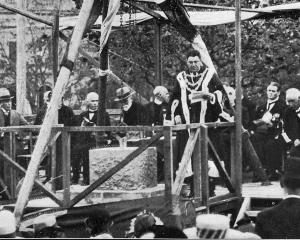It was, however, shrewdly suspected that with modern appliances, and in view of the ever-growing demand for tin, the stanniferous deposits in that part of the world offered a tempting opportunity for the investment of capital. Accordingly a Dunedin syndicate acquired pre-emptive rights to an area on the island of Puket on the west coast of Siam, and subsequently sold their interest to a Melbourne proprietary, whose venture is known as the Tongkah West Tin Mining Company, in which Dunedin shareholders are largely interested.
The intention is to put down additional bores on the property before starting active operations, and then to send out to Puket a powerful dredge to work the alluvial flat secured by the syndicate. This method of tin mining has been in operation in Siamese territory for the past few years by two Australian and one British company. The latter get their dredges made in England and shipped in sections that are put together locally. Dunedin shareholders, however, with their large dredging experience, are of opinion that New Zealand-built machinery would accomplish better work.
In all these matters the promoters of the new enterprise are receiving expert advice from Mr Gilbert P. Blue, who is in Dunedin at the present time, and has had many years' experience in dredging in New Zealand. He comes back to the Dominion full of interesting information concerning the mineral wealth of that part of the world, and of the novel and picturesque surroundings under which it is being exploited.
The island of Puket, said Mr Blue to our representative, is of considerable magnitude, and is inhabited by about 30,000 people, mostly Chinese from the Hockin district of China. There are only 27 Europeans, including three ladies on the island altogether, for the Chinese run the entire show. Life in Puket has some characteristics that are novel to Europeans. The land produces all the tropical fruits - bananas, coconuts, pawpaw, jack fruit, mangoes, and citrus fruits in great abundance. Rice, green vegetables, and potatoes grow freely, and the sea swarms with fine fish. Poultry and eggs are ridiculously cheap, judged by New Zealand prices, but fresh meat is scarce.
Notwithstanding these tropical unpleasantnesses there is every prospect, Mr Blue thinks, of the tin dredging industry being largely developed in a very short time by Europeans and Chinese.
• A peculiar instance of cargo-broaching is reported from Wanganui. A hotelkeeper exhibits a bottle which had a hole skilfully made in it, and the contents extracted. This bottle was one of 13 in a case similarly dealt with. Another local publican found, on opening a case recently, that a number of bottles had been emptied in the same manner while in transit. - ODT, 18.12.1912
• COPIES OF PICTURE AVAILABLE FROM ODT FRONT OFFICE, LOWER STUART ST, OR WWW.OTAGOIMAGES.CO.NZ












